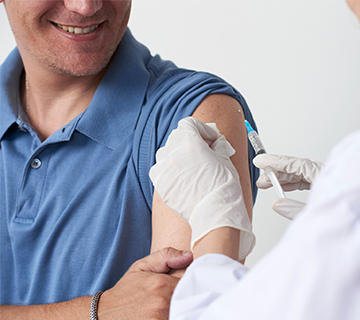Protect Your Health with Vaccinations

Vaccines can prevent or reduce your risk of developing deadly diseases. For example, in the U.S., only about 50 tetanus cases are reported every year thanks to vaccinations. About 75% of these cases are in people who have never been immunized or those who are in old age.
Vaccines are remarkably effective, inexpensive and easy to get. Adults should make sure they’re up to date on all their vaccinations. Some shots may remain effective your entire life, while others need to be administered multiple times throughout your lifetime.
The flu
Thousands of Americans die every year from the flu and flu-related illnesses. The Centers for Disease Control (CDC) recommends everyone 6 months and older get a yearly flu shot. Good news for those with egg allergies: the flu vaccine is no longer made with eggs as of 2020.
The flu is not just a single virus, it’s multiple strains that change every year. That’s why it’s important for you to get the latest flu vaccine annually. It will protect you against most strains of the flu—if you do get sick, your symptoms will be less severe and you’ll recover faster.
Recommended adult vaccinations
You’re given a series of vaccinations as a child, but your immunity can fade over time and new diseases can develop. The Advisory Committee on Immunization Practices released a recommended adult immunization schedule that can give you a good idea of what vaccinations you may need. Here’s what they recommend:
Routine vaccinations are quick and easy to get, and they protect your health for years. Click here to see the full list of recommended immunization for adults.
Everyone is different, though. You should always consult with your doctor about what vaccinations are best for you. Since vaccines are preventive care, they come at no cost to you when visiting providers in FEP's vaccine network. If you need to find a Preferred provider near you, be sure to use our National Doctor and Hospital Finder tool.
Article source link has expired


